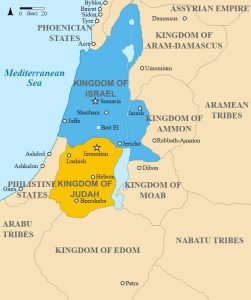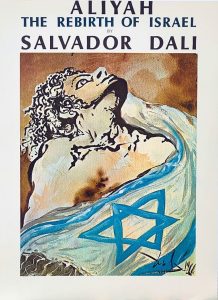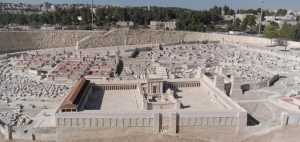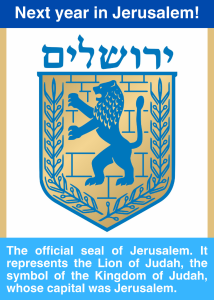
BACKGROUND – TALKING POINTS – ACTIONS – DISPELLING MYTHS
![]()


‘Let My People Go’
Passover is the sacred holiday when Jews gather annually with their families to commemorate the liberation of the Israelites from slavery in Egypt. The thought of celebrating this year’s holiday is unbearable for the Jewish families whose loved ones are still being held by Iran-backed Hamas terrorists in Gaza, or the many who lost loved ones on and since October 7. This Passover, “when Jews recite the words ‘Next Year in Jerusalem,’ we will be thinking of all those who are not with us, hoping for their safe return.”
The Passover story describes the miraculous delivery of the Israelites from slavery in ancient Egypt, recounting G-d’s 10 plagues and the parting of the Red Sea – as described in the Book of Exodus. It is one of the most important events in Jewish history, marking the birth of the Jewish nation and the beginning of their journey toward the Promised Land.
Jewish families celebrate the important holiday by reading the Haggadah – retelling the story of the Exodus – at a ritual Seder dinner. Jews relive the struggle of slavery and bondage – eating symbolic foods, praying and singing ceremonial songs. This year, in honor of the hostages held in Gaza, many are leaving an empty seat at their seder table. The Passover feast begins this year at sundown on Monday, April 22.

The Israelites prepare to cross the Red Sea, in Testament: The Story of Moses. (Courtesy Netflix)
Jewish Independence in Their Ancestral Homeland
Jews have lived in the Land of Israel for more than 3,000 years. The creation of the State of Israel in 1948 marked the rebirth of a Jewish national home after centuries of Jews living in the diaspora.
David established the Kingdom of Israel, succeeded by his son, Solomon. Jerusalem’s First Temple is also known as Solomon’s Temple, is believed to have been completed around 957 BCE. Archaeological evidence supports the Biblical narrative that the city and its temple were destroyed by the Babylonians by 587 BCE.
Following King Solomon’s death around 930 BCE, the kingdom split into the Kingdom of Israel and the Kingdom of Judah. Jerusalem was the capital of Judah and Jews are named after Judah. In Hebrew, Yehudi from Yehuda – Jew from Judea. The regional names Judea (Judah) and Samaria (Israel) were changed to the West Bank in the 1950s.

Approximate map showing the Kingdoms of Israel and Judah. Jerusalem was the capital of the Kingdom of Judah and Jews are named after this region. (Richard Prins)
Jews lived in the Land of Israel under Greek and Roman rule until Simon bar Kokhba led a rebellion against the Roman Empire in 132 CE. Ultimately, Rome crushed Bar Kokhba’s revolt, and according to an ancient Roman historian, 580,000 Jews were killed, and 50 fortified towns and 985 villages were razed.
While some Jewish presence remained over the many years, the land was ruled interchangeably by a host of foreign powers, including the Muslims, Crusaders, Turks and British, until 1948 when Jews were finally allowed to formally return to their ancestral homeland. The founding of the modern State of Israel once again allowed Jews to have autonomy in their own homeland.

Famous Spanish artist Salvador Dali created 25 paintings chronicling Jewish history – Aliyah, The Rebirth of Israel – to celebrate the 20th anniversary of the State of Israel in 1968.
‘Next Year in Jerusalem’
Jerusalem has served as the center of the Jewish people for 3,000 years. The holy city is the spiritual heart of Judaism and Jewish identity:
Jerusalem is one of the world’s oldest cities and serves as the holiest site for Jews, Christians and Muslims. The phrase, “Next year in Jerusalem,” is more than 500 years old and symbolizes the yearning of Jews living in the diaspora to return. A significant custom in the remembrance of Jerusalem is recited by the groom at weddings: “If I forget thee, O Jerusalem, let my right hand forget its skill (Psalms 137:5).”
The history of Jerusalem is marked by many tragedies, including the destruction of the two Jewish Temples, violent persecution and tragic expulsions. Jews were not allowed to pray in Jerusalem at the Western Wall when the eastern part of the city was controlled by Jordan from 1949 to 1967, following Israel’s War of Independence.
Despite millennia of persecution, Jews attained significant achievements in the holy city. Jews have rebuilt their communities – especially after the reunification of Israel’s capital in 1967 – and Israel ensures freedom of religion for Muslims, Christians, Druze and Jews.

The Holyland Model of Jerusalem – including the Second Temple on the Temple Mount – at the Israel Museum, Jerusalem.
![]()

1. Passover is a timeless story about liberation from oppression, for Jews and non-Jews
The Exodus story has been an inspiration to people around the world who have struggled for freedom and equality, and it remains key to Jewish identity and culture. Passover is the most celebrated Jewish holiday by American Jews and Jews around the world. The Exodus was considered so powerful that American slave owners censored certain parts of the Bible – including the demand of Moses to “Let my people go” – to prevent slaves from reading and interpreting these stories in a way that could encourage rebellion. Passover requires Jews to remember the struggles of their ancestors and to continue their legacy through younger generations.
2. Israel has been the ancestral home of the Jewish people for millennia
Jewish independence did not begin in 1948: the modern State of Israel follows the Kingdom of Israel and the Kingdom of Judah – all independent Jewish nations. Jews have maintained a deep connection to the Land of Israel for 3,000 years, rooted in collective memory, cultural traditions and religious texts. Archaeological digs consistently uncover ancient historical, Jewish artifacts in the region – anti-Israel activists cannot erase history. Israel serves as a vibrant hub of Jewish culture, heritage and innovation, embodying the enduring bond between the Jewish people and their ancestral homeland.
3. Jerusalem is the historic capital of Israel and the Jewish people
Jerusalem serves as the official capital for Jews and the State of Israel. Jerusalem represents more than just the physical location of important sites – the Temple Mount and the Western Wall. The holy city embodies the collective memory of Jewish ancestors and the aspirations of generations to return. As Jews gather to celebrate Passover, a time of reflection, remembrance and renewal, families will end their Seders, singing “Next year in Jerusalem.” This phrase symbolizes the 3,000-year history of faith and resilience.
4. Bring them home now: history lives in our hearts yet again
Every moment in captivity inflicts suffering and hardship on the hostages and their families. Jewish history is marked by perseverance in the face of adversity, illuminated by the flicker of hope even in the darkest of times. The call for their release reverberates through generations, echoing the collective prayers, yearning and hope of a people intimately familiar with the agony of separation. But amid the anguish, the spirit of resilience refuses to be extinguished. We must believe that, as in times past, the light of hope will ultimately guide us through the darkness.
![]()

A. Consider these resources to add to your Seder or learn more about the Passover story
B. Remember the hostages at your seder
Options for raising awareness:
C. Share the spirit of Passover so we never forget
Passover presents an opportunity for Jews to discuss the central themes of the holiday: both its specificity to Judaism and its universal messages. The liberation of Jews from the Egyptians is the defining event in Jewish history, and the connection of Jews to Jerusalem is reinforced every year. The Exodus story has inspired generations of Jews and non-Jews in their pursuit of freedom from tyranny and injustice. Passover is a time for Jews to celebrate their history, religion and culture, and to help others better understand Jewish civilization, history, faith and culture. Responding to attacks against Jews is not the only time for Jews to show more pride in their Judaism.
D. Jewish American Heritage Months starts May 1
The Focus Project is a member of the planning coalition for Jewish American Heritage Month. Please visit www.JewishAmericanHeritage.org for more information and resources.
![]()

You might hear: Jews do not have a historical connection to the Land of Israel.
REALITY: Jews have a deep historical connection to Israel that spans thousands of years. The Jewish bond is documented extensively in historical texts such as the Hebrew Bible, as well as in archaeological evidence unearthed in the region. Jewish history dates back before Christianity and Islam.

You might hear: Jews have never had a connection to Jerusalem.
REALITY: Jews have a deep historical and religious connection to Jerusalem dating back 3,000 years – Zion is a historic and symbolic term for Jerusalem. The city holds immense significance in Judaism as the holiest city and the historical capital of ancient Israel, housing the First and Second Temples. The Western Wall, a remnant of the Second Temple, is one of the most sacred sites in Judaism and attracts Jewish worshippers from around the world.
Throughout history, Jerusalem has been central to Jewish religious practices, prayers and cultural identity, even during periods of exile and dispersion. The longing for Jerusalem and the hope for its restoration have been central themes in Jewish worship, literature and tradition for millennia.

![]()
![]()
This content is developed by The Focus Project in partnership with Mercaz USA. The Focus Project distributes weekly news and talking points on timely issues concerning Israel and the Jewish people, including antisemitism, anti-Zionism and the delegitimization of Israel. It represents a consensus view across a spectrum of major American Jewish organizations. Mercaz USA recognizes and respects the diversity of views on these issues among its readers and the community at large.